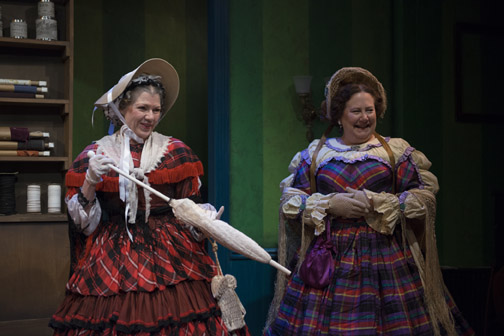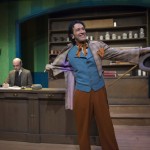From My Seat in the House – By: Mari Lyn Henry
Mrs. Bateman, the daughter of an actor, was probably used to seeing the old comedies of Congreve, Sheridan and Philip Massinger’s A New Way to Pay Old Debts.
These earlier comedies of manners critiqued the hypocrisy of social climbers and named characters to suit their personas such as Lady Sneerwell, Sir Oliver Surface, Sir Benjamin Backbite in School For Scandal and Mrs. Malaprop in The Rivals.
As an actress, she was a keen observer of the follies and foibles she writes about in Self: An Original Comedy. Her characters are steeped in debt to keep up appearances.
The opening scene occurs in an upscale dry goods shop. Messrs. Ellwide and Promptcash are grousing about their decline in business and the mountain of unpaid bills owed them by the social climbing Mrs. Clemanthe Apex, wife of George Apex, a well-to-do banker. The sounds of horse and carriage herald her arrival.
She insists she must have a gorgeous gown. Ellwide tries to sell her a sumptuous gown of embroidered velvet that he assures her belonged to the Empress Eugenie (wife of Napoleon III) for the paltry sum of $700. Put it on my bill, she insists, and when Promptcash serves her with an invoice amounting to almost $6,000, she assures them full payment the next day.
We meet the scandal-mongering Mrs. Radius, the plump widow Codliver who lives to eat and cures her food addiction with Dr. Abernathy’s Pills, various elixirs and “sassy parilla,” Cyrus Cynosure, an affected young man from Paris who sincerely believes that the French are superior in every way to the rising bourgeoisie in America. Mrs. Apex’s first marriage produced Charles Sanford, a lazy, indulged brat who has never worked a day in his life. He uses his charm to squeeze money from his mother’s allowance for his gambling addiction. While Mr. Apex is a respectable banker, his family’s spendthrift ways are contributing to his insolvency.
Like a bird in a gilded cage, there is the beautiful, virginal Mary Apex who adores her father and would do anything for him. An aunt has left her $15,000 and she promises to loan it to him. The stepmother and her son have other plans. Mrs. Apex forges her name on the document to retrieve the money. Mary is evicted from her home when her father mistakenly accuses her of taking the money. Chloe, her faithful mammy, goes with her to find shelter.
Mary’s godfather, “Uncle” John Unit, a former partner of her father, saves the day when he gives her $15,000, a part of the inheritance he has left her in his will. He loathes extravagance and hypocrisy and vows to “show up the rascals.” The loan is contingent upon Charles getting a job and Mrs. Apex becoming a churchgoer. The final tableau is a picture of the family’s domestic bliss.
Alex Roe’s direction captures the style and conventions of the nineteenth century’s comedies of manners. The choice of songs, before the play begins, during scene changes, and at the end, are perfectly suited to the narrative.
The acting ensemble is well cast. Standouts are Page Clements as the social climbing yet vulnerable Mrs. Apex; Erica Knight as Mary; Marie Louise Guinier as the loyal, self-sacrificing Chloe; Noelle McGrath as the gluttonous widow Codliver; Kyle Payne as the affected but extremely funny Cypher Cynosure; and Howard Thoreson as the soft spoken, wise, benevolent John Unit. Able support is provided by Doug Farrell (George Apex), Sidney Fortner (Mrs. Radius), Drew Ledbetter (Charles Sanford), Gary Lizardo and Matt McAllister in several roles.
The technical credits are exceptional: sound, lighting and set design – a special nod to Sidney Fortner who was responsible for the gorgeous period costumes.
“Self: An Original Comedy” by playwright/actress Sidney Frances Bateman (1856) At the Metropolitan Playhouse. 220 E. 4th Street. Plays through Sunday, December 15. Running Time: 3 hours with one intermission.
*Photos Debby Goldman






















